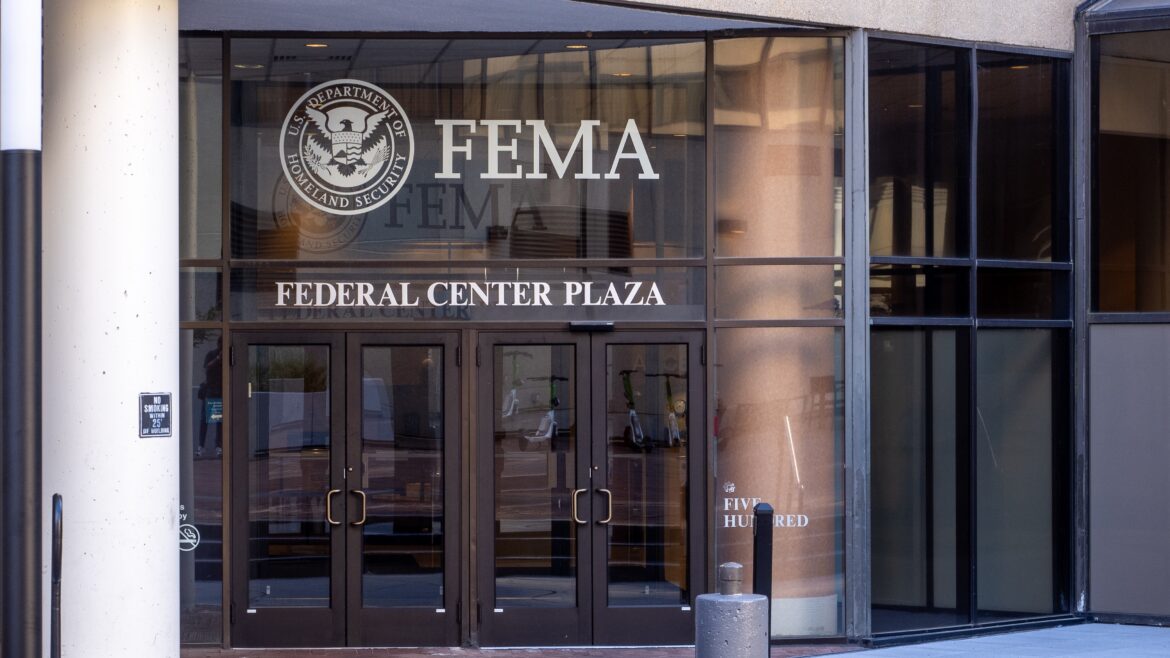CPB asks stations to pause Next Generation Warning System projects, citing holdup of FEMA funds

Wikimedia Commons
FEMA's headquarters in Washington, D.C.
CPB has told stations designated to receive Next Generation Warning System grants to stop work supported by the program because the corporation is unable to access the funds, which are provided by the Federal Emergency Management Agency.
Congress first approved funding for the NGWS program in 2022. The funds support public broadcasting infrastructure projects that enhance stations’ public safety communications. The program received its first round of federal funding in fiscal year 2022 and received additional money in FY23 and FY24.
In total, FEMA has awarded $136 million to establish and implement the program. CPB has approved NGWS grants for 42 stations, which are reimbursed after spending their own funds on projects.
In a Wednesday email obtained by Current, Daryl Mintz, CPB’s CFO and treasurer, told stations in the grant program to halt their NGWS projects. Mintz said CPB had not received formal communication from FEMA about the funds.
“We are in the process of seeking clarification on this situation,” Mintz said. “Nonetheless, given the current situation we must direct you to pause any further commitment of funds including the purchase of equipment (including execution of any contract or purchase order) or services as of today. As soon as we have further information, CPB will provide you an update.”
A CPB spokesperson told Current in an email that “a review is underway at FEMA” that includes the NGWS grants.
“We recognize the difficulty of the stations’ situations, and we are exploring all avenues to move forward expeditiously,” the spokesperson said.
President Trump has authorized the Department of Government Efficiency to cut staff at FEMA and other federal agencies. Representatives for FEMA, which is part of the Department of Homeland Security, have not responded to Current’s requests for comment.
The holdup is jeopardizing stations that have already started spending money on their projects. Among them is KBRW in Utqiaġvik, Alaska, which serves an Inupiat Eskimo population at the northernmost tip of the state. The station had expected to receive up to $98,853 to update emergency messaging equipment.
“We have received no reimbursement yet, and have spent about $65,000,” said GM Jeff Seifert in an email to Current. “If they decided against reimbursement, it would be pretty painful for us to absorb, especially with the threat of a loss of future CPB funding looming.”
‘We hope this is a pause’
KSTK Stikine River Radio in Wrangell, Alaska, is slated to receive up to $90,002 to improve its emergency alert system in remote areas. The funding is intended to help the station replace aging equipment, including a backup generator at its transmitter site, an emergency alert system decoder and a translator.
In an email, GM Cindy Sweat said the station has yet to be reimbursed for any expenses. “The funding was appropriated by Congress in 2022, so technically it’s illegal for that funding to be pulled back,” Sweat said. “We hope this is a pause and not a full stop. However, it’s uncertain at this time if existing rules still matter.”
Radio Catskill/WJFF-FM in Liberty, N.Y., is scheduled to receive up to $135,439 from the grant program. In an email, Tim Bruno said the project includes purchasing a new transmitter and a back-up generator. “The transmitter had been purchased pursuant to NGWS grant guidelines, but we had to stop installation and also had to stop the planned purchase of the generator,” Bruno said. The station has not been reimbursed for the $44,556 it spent on the transmitter and associated items, he said.
North Country Public Radio is also expecting reimbursement. “Our grant total is just over $109,000, and we have spent roughly half of that at this point without receiving any reimbursement for the equipment and labor costs,” said Station Manager Mitch Teich in an email. “It’s obviously something that concerns us a great deal.”
KLRN-TV in San Antonio was approved for $551,426 to replace an aging antenna that would help them adopt the ATSC 3.0 standard. The station has started the bidding process for the project but has not yet found a vendor.
“We were at the stage of still accepting bids, and our timeline was looking to award the bid around the second week of March,” said Kristina Killingsworth, director of digital marketing and programming. “So if there’s a silver lining to anything, it’s that we don’t have a company that’s already done some work for us without payment.”
Blue Ridge PBS in Roanoke, Va., has been approved for up to $1,122,074 to strengthen its signal across its mountainous region and to reach more rural communities. So far it has not paid much to vendors, said CEO William Anderson in an email. But “as a rural station with limited funding available, without this grant, we [are] at a point where equipment and transmission path may deteriorate to the point of service loss to our community,” Anderson said.
KUCB-FM in Unalaska, Alaska, was expecting to receive up to $224,081 to install and upgrade emergency alert system equipment and add needed resiliency equipment. The station currently lacks backup power and a backup transmission location.
The station has spent a little more than $6,000 so far to purchase a DASDEC software unit, “a lot of money for our budget,” said GM Lauren Adams. She said she considers herself lucky that the station hasn’t spent more.
The indefinite pause on funding is troubling, Adams said.
“The risk of losing this grant is a really big deal for us,” she said. “We’re in a tsunami inundation zone. We live on an island with an active volcano. We have a very real need for emergency alerts, and our community still relies on broadcasts for those alerts.”
Correction: A previous version of this article incorrectly said KBRW is in Silakkuagvik, Alaska. The station is in Utqiaġvik.





